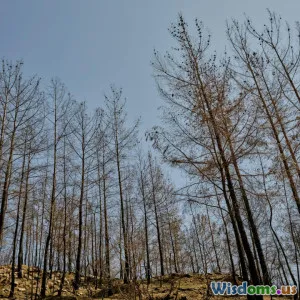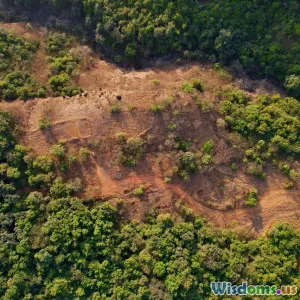
Understanding Ecosystem Services and Their Importance
9 min read Explore ecosystem services and discover why they are vital for sustaining our environment and well-being. (0 Reviews)
Understanding Ecosystem Services and Their Importance
Introduction: The Invisible Lifelines Around Us
Imagine waking up one day to find clean air, fresh water, fertile soil, and nutritious food suddenly unavailable. These essential elements may seem ordinary or abundant, yet they are gifts from nature—ecosystem services that sustain every aspect of our lives. Despite their critical value, these natural processes often go unnoticed until they are degraded or lost.
Ecosystem services are the benefits humans derive from natural ecosystems, encompassing everything from pollination of crops to water purification and climate regulation. Recognizing and preserving these services is fundamental not just for environmental health, but for socioeconomic stability and our very survival.
In this article, we will unravel what ecosystem services are, explore their types with real-world examples, delve into their economic and ecological significance, and discuss why safeguarding them is key to sustainable development.
What Are Ecosystem Services?
Ecosystem services refer to the array of benefits that natural ecosystems provide to humanity. In 2005, the Millennium Ecosystem Assessment, a landmark global scientific study, categorized ecosystem services into four main types:
- Provisioning services: Products obtained from ecosystems such as food, fresh water, timber, fiber, and medicinal resources.
- Regulating services: Benefits obtained from regulation of ecosystem processes like climate regulation, disease control, water purification, and pollination.
- Cultural services: Non-material benefits people gain from ecosystems including recreation, spiritual inspiration, aesthetic value, and educational opportunities.
- Supporting services: Fundamental natural functions like soil formation, nutrient cycling, and primary production that maintain other ecosystem services.
Understanding these categories clarifies how integral ecosystems are to human life and well-being.
Provisioning Services: Nature’s Pantry
Provisioning services are the tangible goods ecosystems provide. Consider the Amazon rainforest, often called the “lungs of the planet,” producing around 20% of the world's oxygen and supplying products like nuts, fruits, and medicinal plants. For instance, approximately 50% of modern pharmaceuticals were derived from natural ingredients found in ecosystems.
Fish stocks from oceans and freshwater bodies feed billions globally. The 2020 FAO report highlighted that fish supplies 17% of the animal protein consumed worldwide, emphasizing ecosystems’ role in food security.
Moreover, freshwater, a vital resource, originates from ecosystems like wetlands and watersheds. Healthy forests filter and regulate the water flowing into our rivers, impacting drinking water quality.
Regulating Services: Nature’s Natural Filters and Climate Controllers
Regulating services are perhaps less visible but equally vital. Wetlands act as natural water filters by trapping sediments and breaking down pollutants, improving water quality. Mangrove forests along coastlines mitigate storm surges and reduce erosion, protecting human settlements from natural disasters.
A critical regulating service is carbon sequestration. Forests and oceans absorb significant portions of human-induced CO2 emissions. The Global Carbon Project reported that terrestrial ecosystems absorb roughly 30% of anthropogenic CO2 annually, mitigating climate change impacts.
Biological control through predators and disease regulation maintains ecosystem balance. For instance, birds and bats help control insect populations, reducing the need for chemical pesticides.
Cultural Services: Enriching Human Experience
Beyond material benefits, ecosystems provide profound cultural and psychological value. National parks like Yellowstone offer recreational and educational experiences that connect people to nature. Sacred groves in many indigenous cultures symbolize spiritual significance and indigenous knowledge systems linked with ecosystem stewardship.
Studies show that access to green spaces improves mental health and fosters community well-being, underscoring the importance of preserving natural landscapes.
Supporting Services: The Foundation of Life
Supporting services underpin all other services. Nutrient cycling—the conversion of organic and inorganic matter—is crucial for fertility and plant growth. Soil formation and photosynthesis sustain food production and biodiversity.
Because these services operate behind the scenes, their gradual deterioration often leads to cascading environmental problems. Desertification in the Sahel region of Africa, influenced by overgrazing and deforestation, exemplifies the collapse of supporting services resulting in widespread food insecurity.
Economic and Ecological Importance
The global economy is intertwined deeply with ecosystem services. The Economics of Ecosystems and Biodiversity (TEEB) initiative estimates that nature’s contributions translate into trillions of dollars annually. For example, pollination alone contributes an estimated $235–577 billion per year worldwide to agricultural productivity.
Loss of ecosystem services can have dire economic consequences. The collapse of fisheries in the North Atlantic during the late 20th century resulted in economic hardship and the devastation of coastal communities.
Ecologically, diverse ecosystems enhance resilience against shocks like pests, disease outbreaks, or climate extremes. Biodiversity underpins ecosystem stability and recovery, ensuring services remain reliable over time.
Challenges and Threats to Ecosystem Services
Despite their irreplaceable role, ecosystem services are under severe threat:
- Deforestation: The Food and Agriculture Organization (FAO) reports that 10 million hectares of forest are lost annually, reducing carbon absorption and biodiversity.
- Pollution: Contamination of air, water, and soil impairs natural regulation services, threatening human health.
- Climate Change: Shifts in temperature and precipitation patterns destabilize ecosystems, affecting food and water security.
- Habitat Fragmentation and Urbanization: Fragmented landscapes impede species movement, diminishing ecosystem connectivity and function.
Addressing these requires integrating ecosystem service valuation into policy and planning.
Towards Sustainable Management of Ecosystem Services
Recognizing ecosystem services encourages sustainable stewardship. Payment for Ecosystem Services (PES) schemes reward landowners and communities for conservation efforts. Costa Rica’s PES program has successfully increased forest cover by providing financial incentives to preserve ecosystems.
Nature-based solutions like restoring wetlands for flood control or urban green infrastructure reduce risk and improve quality of life sustainably.
Incorporating ecosystem service assessments into urban and agricultural planning leads to more informed decisions, benefiting both nature and society.
Conclusion: Valuing Nature to Secure Our Future
Ecosystem services are the foundation of life on Earth, supporting not only environmental integrity but also economic prosperity and human health. Yet, they remain undervalued and threatened by human activities. By understanding and integrating the value of these natural processes into decision-making, we can champion sustainability.
As the renowned ecologist Gretchen Daily emphasizes, “What gets measured gets managed.” Prioritizing ecosystem services in policy, individual choices, and corporate responsibility is pivotal.
Humility and respect for nature's invaluable services inspire us to protect biodiversity and ecosystems—not just for ourselves but for generations yet to come. Our future depends on it.
Rate the Post
User Reviews
Popular Posts





















